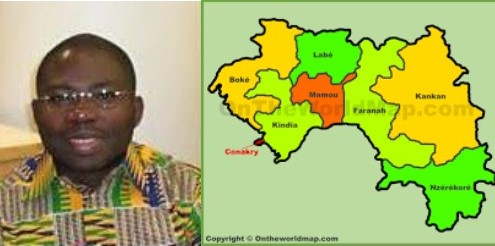PHOTO: Dr. Michel Yoboue, Chairman of the MRU CSO Platform
Press Statement 22 November 2020
(Monrovia – Liberia): The Mano River Union Civil Society Natural Resources Rights and Governance Platform (MRU CSO Platform), has described as a monumental victory against impunity, the November 10, 2020 guilty verdict against the Guinean Government at the ECOWAS Court over the massacre of villagers, in the Zogota community, Southeastern Guinea between Liberia and Côte d’Ivoire.
The case was filed before the ECOWAS Court of Justice for redress on October 18, 2018 after Guinean authorities failed to investigate the massacre five years after its occurrence in 2012. Following arguments by the parties, the Court adjudged that Guinea was responsible for the murder, arbitrary arrest, and torture of residents of Zogota.
The Court ordered Conakry to pay 83,238 euros (or its equivalent in Guinea Francs) to beneficiaries of each of the six murdered persons, amounting to 2.6 million euros. The Court also mandated the Guinean government to compensate 15 other victims with about 3.6 billion Guinea Francs in total, an equivalent of 312,144 euros.
A spokesperson of the massacre victims, Kpakilé Gnadawolo Kolié said: “For more than eight years, we waited for the case in Guinea to go forward… we are grateful that the ECOWAS Court of Justice has restored our rights.”
Reacting to the verdict, the Chairman of the MRU CSO Platform, Dr. Michel Yoboue said, “This verdict is a massive victory for grassroot campaigners whose voices and cries have been hushed in corporate capture across the region; we are calling on Guinean authorities to respect the regional instrument and accordingly adhere to reparation dictates in bringing some measure of relief to the afflicted families.”
The President of Les Mêmes Droits pour Tous (MDT), a Guinean human rights group that has been fighting the case, Lawyer, Mr. Foromo Frédéric Loua, expressed excitement about the outcome; but he’s also wary about the next stage, for which “collective pressure from partners in the sub-region must be exerted on Guinean authorities to pay the stipulated amount to the victims within the mandated time of six months.”
He said “the people are very happy about the verdict, but we are hoping that the Government will pay because in the past they refused to pay reparations.”
Foromo further hopes that the Guinean Government will now move to prosecute the perpetrators of the massacre. “We are also expecting to see heads of security agencies and agents of the company who facilitated the attack to appear in a domestic court in Guinea to answer to their crimes.”
On August 4, 2012, Guinean troops ruthlessly quelled a demonstration by residents of the southeastern Guinean village of Zogota. The villagers were protesting in demand for jobs from the exploitation of iron ore in their area, which left them with nothing but, environmental pollution, destruction of their properties and sacred sites.
Local communities say, the Guinean troops, abetted by Vale-BSG Resources, a transnational company with roots in Brazil and Israel, invaded the village under the cover of darkness shooting and killing at least six of the villagers, wounding many others, while they burned homes and looted their belongings. Those who fled the scene were arrested, tortured and detained, the complaint says.
Government lawyers told the Court that the security forces had moved in to secure the mining site and the properties of the company. The security “were forced to defend themselves at the risk of leaving their skin there,” the government’s legal team told the court in writing.
The MRU Platform insists that, as a signatory to the International Criminal Court (ICC), Guinea is under international obligation to investigate the gruesomely murder of these locals by Guinean security forces.
“More than 8 years after the massacre, the Government of Guinea has demonstrated that it is both unwilling and genuinely unable to investigate and prosecute these grave crimes,” asserted Alfred Brownell, Lead Campaigner of Green Advocates International, co-founder of the MRU CSO Platform.
Utilizing the preliminary evidence assembled by the ECOWAS Court, Alfred challenged “The Special Prosecutor of the ICC to get seized of the matter under the principle of complementarity to investigate and prosecute individuals who it determines would be most responsible for these crimes”.
He also implored “the United Nations Special Rapporteur on Extra-Judicial killings, to also immediately launch an investigation to identify and hold accountable the perpetrators of those killings.”
MRU CSO Platform remains very appalled by the fact that the Guinean authorities willfully failed to launch an investigation into the heinous crimes, even though the matter was brought before a local judge in 2012.
The Platform urges its members in Guinea – the local indigenous Zogota communities, activists, land rights and environmental defenders as well as organizations such as Les Mêmes Droits pour Tous (MDT), Center of Excellence for Environmental Law (CEDE) and Centre du Commerce International Pour le Development (CECIDE) to remain vigilant in the wake of the Zogota verdict.
Zogota lies on the border between Liberia and Côte d’Ivoire and its home to huge deposits of iron ore in the Simandou mountain range.
The ECOWAS Court’s decision on the Zogota massacre is an important message to investors headed to the region for the exploration of natural resources that gone are the days that they will conspire with corrupt and repressive regimes to ignore the legitimate concerns and cries of the people and go without check.
Corporate accountability, especially for underserved communities on the frontline of concession operations in West Africa, is the preoccupation of the Mano River Union Civil Society Natural Resources Rights and Governance Platform. And with the early successes scored by and through its legal affiliate, the Public Interest Lawyering Initiative for West Africa (PILIWA), it is safe to say, hope is alive.

